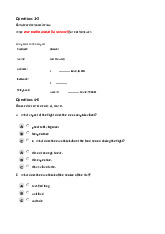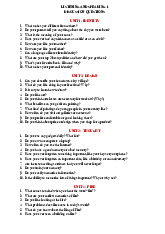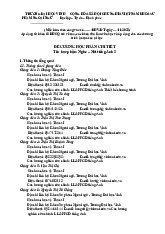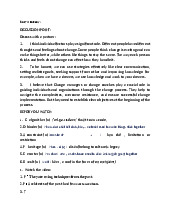







Preview text:
See discussions, stats, and author profiles for this publication at: https://www.researchgate.net/publication/372631010
Enhancing the Students' Reading Ability through an Intensive Reading Approach Article · July 2023 DOI: 10.36423/altics.v4i2 CITATIONS READS 0 119 3 authors, including: Yusuf Hidayat STAI Putra Galuh Ciamis
44 PUBLICATIONS 46 CITATIONS SEE PROFILE
Some of the authors of this publication are also working on these related projects:
Penggunaan Kosakata Bahasa Jawa dan Bahasa Indonesia dalam Meningkatkan Kemampuan Berbahasa Anak Usia Dini View project
The 1 st International English Applied Linguistics Seminar and Workshop (TIEALLSAW) View project
All content fol owing this page was uploaded by Yusuf Hidayat on 26 July 2023.
The user has requested enhancement of the downloaded file.
Journal of Applied Linguistics ISSN 2721-995X (Printed) ISSN 2721-0316 (Online) Vol 4, No 2 (2023), pp. 21-27 (ALTICS)
https://www.e-journal.unper.ac.id/index.php/ALTICS
Enhancing the Students’ Reading Ability through an Intensive Reading Approach
Rini Purbayani1), Ani Herniawati2), Yusuf Hidayat3)
Stai Putra Galuh Ciamis
rinipurbayani@staiputragaluh.ac.id1); aniherniawati@staiputragaluh.ac.id2); yusufhidayat@staiputragaluh.ac.id3) Abstract
Intensive reading approach (IRA) is a kind of reading approach which involves the detailed reading of texts
with the two goals of understanding the text and learning language features. This study aims to explain the
effects of intensive reading approach (IRA) toward the students’ reading ability. In this study, the
researchers addressed a research question: what the effects of intensive reading approach (IRA) towards
the students’ reading ability development? To find out the answer, the researchers applied qualitative
method under survey design, particularly a cross-sectional survey design at which they administered
questionnaires to 10 students of Early Childhood Education Department, STAI Putra Galuh Ciamis. The
respondents were chosen randomly as the sample. The results of the study asserted that intensive reading
approach (IRA) give the significant effects towards the students’ reading ability at which they obtain new
vocabularies, understand more the specific text, and write sentences by their own words. Besides, they are
able to read the text faster and their interest in reading is enhanced more than the previous one. Thus, the
effects of intensive reading approach (IRA) influence not only for the students’ reading, but also for their
writing ability. In conclusion, intensive reading approach (IRA) give significant effect towards the students’ reading ability.
Keywords: reading ability; intensive reading approach INTRODUCTION
In English Language Teaching, there are four language skills that should be mastered by the
English language students. One of them is reading skill. Reading is categorized as receptive skill
such listening. Meanwhile, other skills such speaking and writing are categorized as productive
skills. In the context of reading as receptive skill, it plays an important role because through reading
the English language students can learn many aspects, such as recognizing vocabularies,
identifying the grammar, understanding the topic sentence, recognizing the information both
explicit and implicit through scanning and skimming. By means of the aforementioned aspects,
the students are going to learn the integrated comprehension of English through the process of
reading (Andrés, 2020, p. 2; Wahyuningsih, Nafisah, Mulyono, & Hidayat, 2023: p. 17).
To obtain the significant process and result of reading, the teacher needs a suitable strategy
to teach and guide the students during conducting reading activity. One of the strategies to enhance
the students’ reading ability is intensive reading (IR). Dealing with IR, it can be understood as a 21
kind of reading approach which involves the detailed reading of texts with the two goals of
understanding the text and learning language features through a deliberate focus on these items
(Nation, 2004 as cited in Bogoya González, 2011, p. 38). In addition, intensive reading approach
(IRA) is meant as an approach of reading focuses on comprehending the new words, phrases, and
idioms taught by teacher within the narrative or expository texts, besides focuses on content and
grammatical structures (Andrés, 2020, p. 71; Wahyuningsih, Nafisah, Mulyono, & Hidayat, 2023:
p. 18). In short, IRA refers to an approach of reading functions to complete comprehension of the
text, because IRA is deemed as an effective approach to enhance students’ reading comprehension
(Taembo, 2018: p. 78; Andrés, 2020, p. 72; Hidayat & Herniawati, 2023, p. 41).
In the implementation, IRA is carried out through three phases. Those are: pre-, while-, and
post-reading. These phases of reading are meant to have better preparation, implementation, and
reflection towards the result of reading process carried out by teacher and the students in the
classroom (Andrés, 2020, p. 72; Wahyuningsih, Nafisah, Mulyono, & Hidayat, 2023: p. 19).
Practically, the three phases aforementioned are carried out as follow:
1. Pre-reading, in this phase teacher prepares the reading activities. This activity includes checking
the text, predicting the text, asking and answering dealing with the text, and introducing key vocabulary towards the text.
2. While-reading, in this phase the teacher and students carry out the reading activities. The
activities include reading and re-reading the text intensively through careful and focused
reading, then looking at the information, language structure, and vocabularies of the text.
3. Post-reading, in this phase the teacher and students summarize the text. Besides, the teacher
assess the students’ understanding towards the text read by the students. This assessment is the so-called reflection.
In another perspective, Westwood (2008, p. 44) states that the implementation of IRA in the
classroom consists of six main points. Those points cover as follow:
1. Carrying out self-monitor for understanding;
2. Finding out the main idea within the paragraph;
3. Delivering self-question as the students read;
4. Making references and connections within the text and the prior knowledge;
5. Retelling key information such restating the gist of paragraph within the text;
6. Summarizing key points within the text. 22
In addition, Westwood (2008, pp. 45-46) explains that there are other basic steps in
implementing IRA. Those steps are as follow:
1. Predicting information found within the text, then find the answer;
2. Reading the text carefully, with your predictions and questions in mind;
3. Being able to prove the evidence within the text, then making conclusion from the text read.
Dealing with the statement expressed by Westwood (2008) aforementioned, it can be
summarized that in teaching reading in the classroom by using IRA, the teacher should teach the
students by using variety of strategies. Those strategies cover: (1) the teacher asks for the students
to focus on reading topic, (2) the teacher asks for the students to predict what issue that may be
found in reading the text, (3) the teacher asks for the students to find the main idea in a paragraph,
(4) the teacher asks for the students to find the key idea in a paragraph, (5) the teacher asks for the
students to make some references or the new words, (6) the teacher asks for the students to
summarize the points that you gain from the reading text, and (7) the teacher asks for the students
to make a conclusion from the students’ reading (Sarip & Hidayat, 2019; Mulyawati & Marini, 2022; Hidayat, 2023).
This study is also supported by some previous studies to support the originality of this
research. The first study was conducted by Bogoya González (2011). The results of the study show
that students improved their reading comprehension ability as their scores for the post-test were
higher than those of the pre-test. In addition, reading in science text should be seen as dynamic
process that incorporates students’ strategies in order to develop their conceptual understanding.
The second study was conducted by Taembo (2018). The results of the study show that t-count is
higher than t-table. It means that there was a significant difference on students’ vocabulary growth.
Besides, the achievement of students under extensive reading was better than the students’
vocabulary achievement under intensive reading approach. The last study was conducted by
Andrés (2020). The results of the study show that reading comprehension strategies improved
students’ comprehension because the utilized strategies assisted them to solve the problems
experienced by the students during reading the passages.
Regarding to the three previous studies presented above, the second and third previous
studies are similar to the present study which focuses on intensive reading in enhancing the
students’ reading comprehension. Meanwhile, the first previous study is dissimilar to the present
study, because it focuses on extensive reading and intensive reading approaches towards students’ 23
vocabulary growth. Meanwhile, the overall previous studies are utilized as the underpinned
references towards the present study. In addition, in this study the researchers also intends to
highlight a research questions, it is: “what the effects of intensive reading approach (IRA)
towards the students’ reading ability development?” Related to the answers of the research
question aforementioned, it is going to be discussed in the forthcoming part of this article. METHOD
In this present study, the researchers applied qualitative method under survey design,
particularly a cross-sectional survey design as suggested by Fraenkel, Wallen, & Hyun (2012);
Creswell (2012). Concerning the cross-sectional survey design, it is understood as a collection of
the data which only takes a short time (Fraenkel, Wallen, & Hyun, 2012, p. 377). In addition,
Creswell (2012, p. 377) argues that qualitative method under cross-sectional survey design is a
design in qualitative methodology at which the researcher collects data at one point in time. Then,
the data are processed qualitatively.
Dealing with the respondents of the present study, the researchers took 10 EFL students who
were chosen randomly from Early Childhood Education Department, STAI Putra Galuh Ciamis as
the respondents. They all are EFL learners. The reason for choosing them because the researchers
were so curious to know about the students’ reading ability in the college level. Referring to the
data collection procedure, the data were gained by administering questionnaires to 10 students.
Each questionnaire consisted of five questions. After the data were collected, the researchers then
analyzed them qualitatively. It was used to describe the data in percentage (Dornyei & Taguchi, 2010).
FINDINGS AND DISCUSSION
In interpreting the data, the researchers analyzed all the answers written by the respondents.
Then, the data are described as follow: No. Questions Answers 1.
Do you agree to learn reading by means of intensive 100% answered, yes, we do. reading approach (IRA)? 2.
Do you have any problems in learning reading by
80% of respondents answered that they have a problem in
means of intensive reading approach (IRA)? Please
intensive reading, because (1) they felt difficult to understand explain it.
the texts; (2) they must be able to comprehend detail of the
texts at which it has a lot of new vocabularies; (3) they also
need to look up the dictionary, and most of them did not like reading. 24
Then, 20% of respondents did not have any problems,
because they believed if they learnt intensive reading
seriously they could understand the meaning of the texts in details. 3.
Do you think intensive reading approach (IRA) is
Based on their answers, 50% of respondents said that
interesting during learning reading English text?
intensive reading approach (IRA) is interesting. Meanwhile,
the other 50% of the respondents said that intensive reading
approach (IRA) is not interesting. 4.
Do you think intensive reading approach (IRA) used Regarding to the answers, 70% of respondents stated that
by your lecturer is helpful to improve your reading
intensive reading approach (IRA) is helpful and could ability? Please explain.
improve their reading ability. Meanwhile, 30% of
respondents answered that intensive reading approach (IRA)
could not improve their reading ability. 5.
If intensive reading approach (IRA) is helpful for you, Dealing with the answers, 70% of respondents said that: (1)
to what extent IRA improve your reading ability?
they could understand more the specific text than in Please explain it.
preceding time; (2) they also could increase their vocabulary
better; (3) they could also write sentences by their own
words; (4) they could read the texts faster and their reading
interest is increased more than in preceding time.
Meanwhile, 30% of respondents answered that IRA did not
increase their reading ability. (Data, 2022)
Regarding to the findings as mentioned in the preceding point, intensive reading approach
(IRA) is assumed as a useful approach to enhance the students’ reading ability. In the respondents’
opinion, through learning intensive reading approach (IRA) they could gain a lot of new
vocabularies and understand the specific text in order that they could write sentences by their own
words. Nevertheless, 30% of the students think that intensive reading approach (IRA) makes bored
and waste their time to face the difficulties during learning English reading in English class. Thus,
they have to throw far away their negative mind-set and their boredom if they want to have a sufficient reading ability.
In accordance with the research question set forth in the preceding paragraphs, “what the
effects of intensive reading approach (IRA) towards the students’ reading ability
development?” Based on the answer from the fifth question in the questionnaire, it can be
concluded that intensive reading approach (IRA) has significant effects to enhance the students’
reading ability. Besides, they are able to read the text faster and their interest in reading is enhanced
more than the previous one. Thus, the effects of intensive reading approach (IRA) influence not
only for the students’ reading, but also for their writing ability.
Dealing with the answer to the research question above, the answer becomes the findings of
the present study. The findings aforementioned are in line with the findings of previous research
conducted by Bogoya González (2011), Taembo (2018), and Andrés (2020) which found IRA can
enhance the students’ reading ability and building vocabulary. Meanwhile, in this present study,
IRA could enhance not only the students’ reading ability and building vocabulary, but also the 25
students could understand the specific text, besides they could write sentences by their own words.
Thus, this findings becomes the novelty of the present study. CONCLUSION
In this part, the researchers would like to sum up that intensive reading approach (IRA) give
the significant effects towards the students’ reading ability at which they obtain new vocabularies,
understand more the specific text, and write sentences by their own words. Besides, they are able
to read the text faster and their interest in reading is enhanced more than the previous one. Thus,
the effects of intensive reading approach (IRA) influence not only for the students’ reading, but
also for their writing ability. Nevertheless, having spirit to undertake continual practice and
habitual reading activities become more essential key to get better reading ability. Besides that,
the lecturer and parents should support the students to make reading activity become their habitual
action. Because a good reader would be a good learner and a good writer that would be useful for
every student at college level. ACKNOWLEDGEMENTS
The researchers thank to the leaders and management of STAI Putra Galuh Ciamis, West Java for
the profound supports in this scientific activity to be published in ALTICS. REFERENCES
Andrés, I.C. (2020). Enhancing reading comprehension through an intensive reading approach. HOW, 27(1), 69-82.
Bogoya González, A.P. (2011). Fostering fifth graders’ reading comprehension through the use of
intensive reading in physical science. Colombian Applied Linguistics Journal, 13(1), 39-57.
Creswell, J.W. (2012). Educational research: planning, conducting and evaluating quantitative
and qualitative research, fourth edition. Boston, USA: Pearson.
Dornyei, Z., & Taguchi, T. (2010). Questionnaires in second language research: construction,
administration, and processing 2nd edition. New York: Routledge, Taylor & Francis.
Fraenkel, J. R., Wallen, N. E., & Hyun H. H. (2012). How to design and evaluate research in
education, 8th edition. New York: The McGraw-Hill companies Inc. 26
Hidayat, D. (2023). Improving students reading comprehension through intensive reading for college students. INOVISH Journal, 8(1), 99-110.
https://doi.org/10.35314/inovish.v8i1.3253.
Hidayat, Y., & Herniawati, A. (2023). The realization of genre analysis on students’ essay: a
classroom discourse perspective. Journal Corner of Education, Linguistics, and Literature,
3(1), 40–48. https://doi.org/10.54012/jcell.v3i1.171.
Mulyawati, Y., & Marini, A. (2022). Utilization of digital library to increase reading interest in
elementary school students. Jurnal Pendidikan dan Pengajaran Guru Sekolah Dasar (JPP Guseda), 5(1), 20-24.
Sarip, S.K., & Hidayat, Y. (2019). The clause complex construction realised in the short story
entitled “The Witch’s Brew”. Journal of Applied Linguistics, 1(1), 1-14.
Taembo, M. (2018). A comparative study between extensive reading and intensive reading
approaches towards students’vocabulary growth to the year two of one of the junior high
schools in Kendari. Tirai Edukasi: Jurnal Pendidikan, 1(1), 77-86.
Wahyuningsih, S., Nafisah, P., Mulyono, N., & Hidayat, Y. (2023). The utilization of SQ3R
method to enhance English reading skills: students’ voices in the Indonesian higher
education context. International Journal Corner of Educational Research, 2(1), 17–22.
https://doi.org/10.54012/ijcer.v2i1.175.
Westwood, P. (2008). What teachers need to know about reading and writing difficulties? Victoria: ACER Press. 27 View publication stats
Document Outline
- Abstract
- INTRODUCTION
- METHOD
- FINDINGS AND DISCUSSION
- CONCLUSION
- ACKNOWLEDGEMENTS
- REFERENCES




